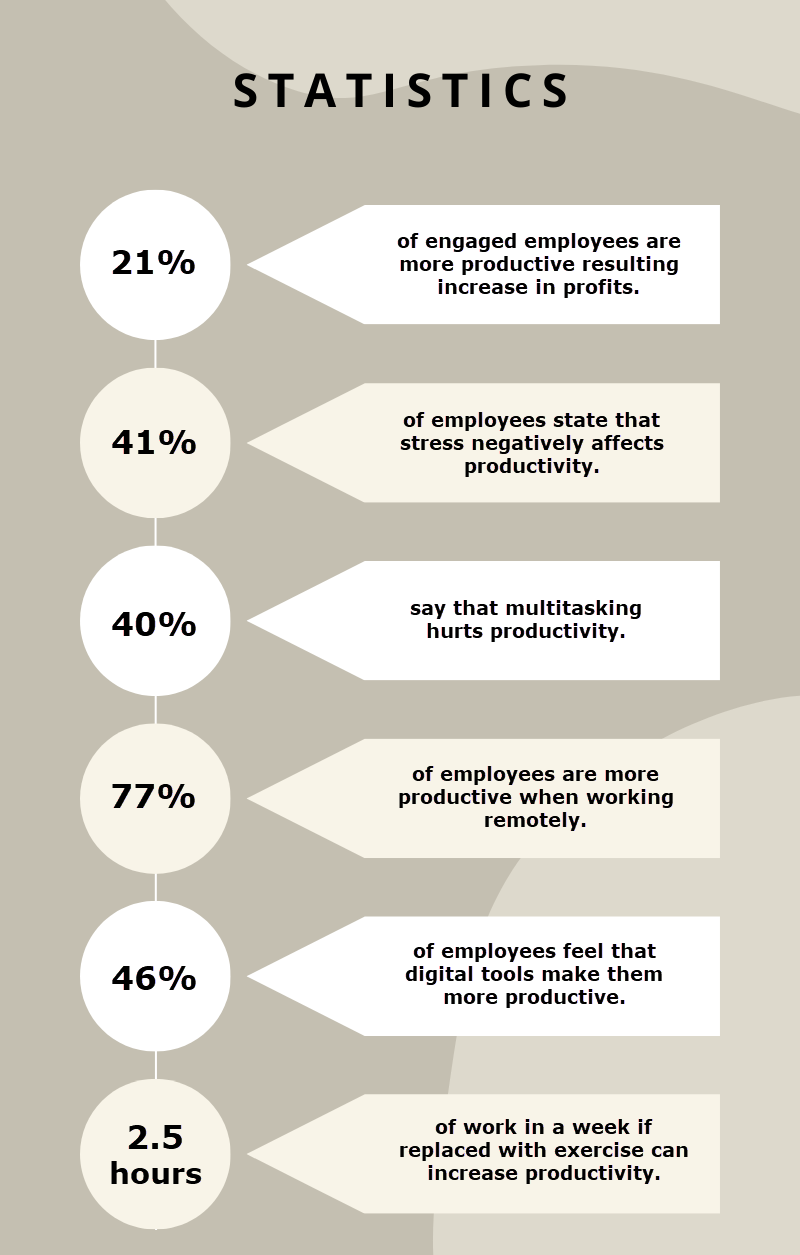What is the meaning of being Productive?
According to the US Bureau of Labor Statistics, productivity is a measure of economic performance that compares the amount of goods and services produced(output) with the amount of inputs used to produce those goods and services. Being productive is getting most of your work, time and energy to achieve your goals.

Productivity can be measured differently, depending on your goals and priorities. For some people, productivity means completing specific tasks on a to-do list. For others, it means progressing on a long-term goal, such as learning a new skill or writing a book.
It is not about long work hours but about the quality of time you spend to get the desired output.
Related Links
Why is Productivity important?
Productivity is the ability to produce valuable work effectively and efficiently. It is a crucial factor in determining the success of both businesses and individuals.
Productivity for Businesses: Driving Growth and Revenue
For businesses, productivity is essential for achieving growth and increasing revenue. Employees who are more productive can produce more goods or services with the same amount of time and resources. This leads to increased profits and a stronger competitive position in the market.
Here are some of the specific benefits of productivity for businesses:
- Increased output: More productive employees can produce more goods or services, boosting sales and revenue.
- Lower costs: Improved productivity can lead to lower production costs, making businesses more profitable.
- Higher customer satisfaction: Productive employees are likelier to provide excellent customer service, increasing customer satisfaction and loyalty.
- Reduced stress and burnout: A productive work environment can help to reduce stress and burnout among employees, leading to a healthier and more engaged workforce.
Productivity for Individuals: Unleashing Potential and Fueling Growth
For individuals, productivity is essential for using their talents to their full potential and achieving their personal and professional goals. Individuals who are more productive can accomplish more in less time, leading to increased opportunities, higher earnings, and a greater sense of accomplishment.
Here are some of the specific benefits of productivity for individuals:
- Increased achievement: Productive individuals are more likely to achieve their goals, both personal and professional.
- Enhanced time management: Individuals can learn to manage their time more effectively by being more productive, freeing time for personal pursuits and relaxation.
- Reduced stress and burnout: Just as for businesses, a productive work environment can help to reduce stress and burnout among individuals, leading to a better quality of life.
- Greater career satisfaction: When individuals can accomplish more and use their skills effectively, they are more likely to be satisfied with their careers.
Template to measure Employee Productivity
Our productivity measurement templates are designed to help you track your employees’ performance on a daily or weekly basis.
Simply enter the relevant data, and our templates will create charts that make it easy to understand the results. This will help you identify areas for improvement and make data-driven decisions to boost productivity.
How to be more Productive?
Here are some tips for being more productive:
Establish Clear Goals and Break Them Down
Define your objectives and break them into smaller, more manageable tasks. This will make your goals seem less daunting and more achievable.
Prioritize Your Tasks
Identify the most critical tasks that require your immediate attention. Focus on completing these tasks first to ensure progress and avoid feeling overwhelmed.
Leverage Time Tracking Tools
Utilize time-tracking software to gain insights into your time allocation for each task. This will help you optimize your schedule and improve your efficiency.
Eliminate Distractions
Minimize distractions by silencing notifications, closing unnecessary tabs, and finding a quiet workspace.
Conquer Procrastination Proactively
Address challenging tasks head-on instead of delaying them. Break them down into smaller steps and seek assistance if needed.
Take Regular Breaks
Schedule short breaks every 20-30 minutes to stretch, move around, and clear your mind. This will help you maintain focus and prevent burnout.
Reward Yourself for Accomplishments
Celebrate your achievements, no matter how small, to boost motivation and maintain a positive attitude.
Productivity is not about working harder; it’s about working smarter. By following these tips, you can learn to work more efficiently and effectively, and you’ll be able to achieve your goals more quickly.

